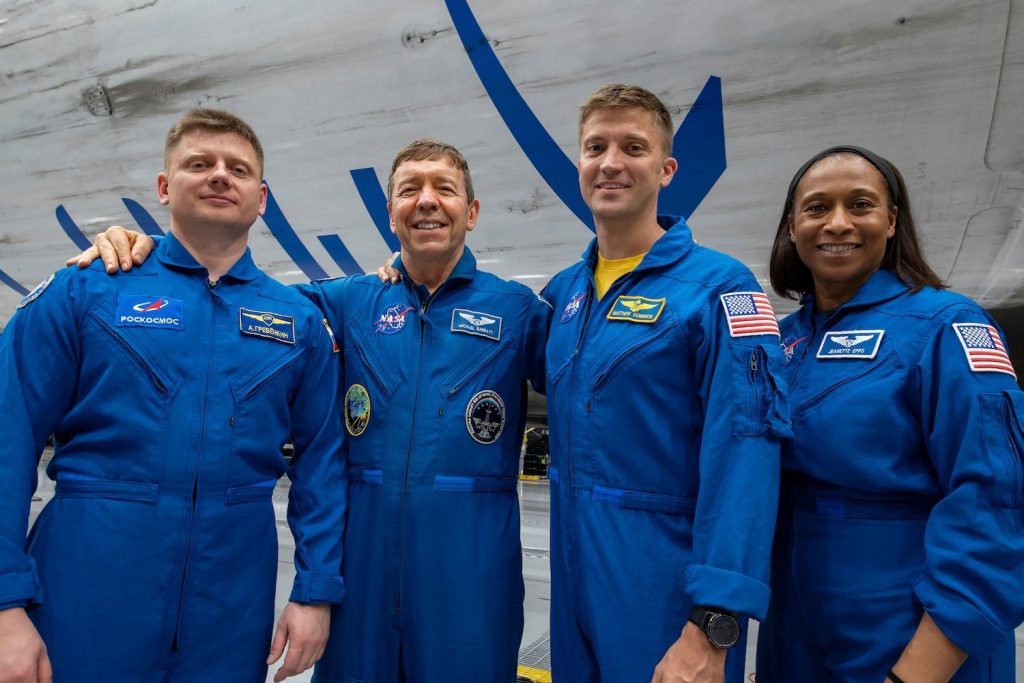
NASA Remains Stubbornly Silent on Why Crew Went to Hospital After Dragon Splashdown (Image Credit: Gizmodo-com)
A press conference held earlier today was an opportunity for NASA to explain why four Crew-8 astronauts were sent to a hospital after splashing down on Earth on October 25, but the agency and its astronauts quickly shut down any attempt by journalists to glean more information.
NASA’s SpaceX Crew-8 mission returned to Earth after spending eight months on board the International Space Station (ISS). Upon their return home, all four astronauts were hospitalized and one was forced to spend an overnight stay due to an unidentified medical issue.
“Space flight is still something we don’t fully understand, we’re finding things that we don’t expect sometimes. This was one of those times, and we’re still piecing things together on this and so to maintain medical privacy and to let our processes go forward in an orderly manner, this is all we’re going to say about that event at this time,” NASA astronaut Michael Barratt told reporters on Friday. “That leaves us 235 days, three hours and 35 minutes of Crew-8 experience that is open to your questions.”
Naturally, the first question from the room was, why? “I did not say I was uncomfortable talking about it, I said we’re not going to talk about it,” Barratt, who is also a physician, reiterated. “Space medicine is my passion…and how we experience human spaceflight is something that we all take very seriously.” The astronaut added that in time, NASA will allow this information to be documented and released, but medical privacy and following through with the proper process are the two main priorities for the space agency at the moment.
Crew-8 includes NASA astronauts Barratt, Matthew Dominick, Jeanette Epps, as well as Roscosmos cosmonaut Alexander Grebenkin (who did not take part in the news conference due to his travel schedule). The four astronauts launched to the ISS on March 4, and spent a total of 232 days on board the ISS, traveling nearly 100 million miles and completing 3,760 orbits around Earth, according to NASA.
The crew splashed down off the coast of Florida, riding on board a SpaceX Dragon spacecraft. Even though the crew capsule performed a normal entry and splashdown, all four astronauts were flown to a hospital in Florida for post-flight medical evaluations “out of abundance of caution,” NASA wrote at the time.
Three of the crew members departed the hospital while one unnamed astronaut stayed behind for an overnight stay, presumably due to a medical issue. The identity and specifics of the astronaut’s condition were not shared by NASA to protect their privacy. The unidentified astronaut was released the next day and was in “good health,” according to the space agency.
Shortly after the incident, a member of a NASA safety panel urged SpaceX to focus on the safety of the crew during the commercial trips to the ISS. “Both NASA and SpaceX need to maintain focus on safe Crew Dragon operations and not take any ‘normal’ operations for granted,” Kent Rominger, a former astronaut and member of the Aerospace Safety Advisory Panel, said during the panel discussion.
One possible interpretation of Rominger’s statement is that the crew’s safety might have been compromised during their return on the Dragon spacecraft or because of its splashdown in the ocean. However, it’s unclear if this was the case, or if the crew experienced a medical issue from their stay on the ISS. It’s also possible Rominger was referring to other unusual Crew Dragon flights this year. Regardless, SpaceX is now under the safety microscope.
In February 2022, a Dragon cargo spacecraft experienced an anomaly on its way back to Earth, with a delayed opening of one of its parachutes. This was the second time one of Dragon’s parachutes failed to open on time, with the same issue occurring during the splashdown of the Crew-2 mission. No such issue was reported during the Crew-8 reentry, NASA says.
The astronauts’ return to Earth was delayed repeatedly for several weeks because of hurricane Milton, forcing the space agency to forgo an undocking attempt on October 7. That’s in addition to the mission being extended from the usual six month crew rotation on the ISS to nearly eight months in space. The crew was originally scheduled to return in mid-August but NASA extended the mission to keep the Dragon spacecraft docked to the ISS for Starliner’s stranded astronauts in case of an emergency.
Although humans have spent longer periods of time in space, with two Russian cosmonauts recently breaking the record for longest stay on the ISS by spending 374 consecutive days on board the space station. There are still a lot of unknowns about the effects of spaceflight on the human body since only a few select humans have gotten to experience being in microgravity for months at a time. As NASA and other space agencies aim to launch crews for long-duration stays on the Moon, and perhaps Mars one day, there’s a lot more research that needs to be done on how human bodies begin to deteriorate in the weightless environment.
As Crew-8 astronaut Dominick’s first time on board the ISS demonstrated, humans experience space differently. “The big things you expect, right? Being disoriented, dizzy,” Dominick, who conducted research on board the ISS by sitting on a bicycle chair, said on Friday. “But the little things, like just sitting in a hard chair…it’s rather uncomfortable and I did not expect that, right? It wasn’t in a book I read, like, ‘hey, you’re going to space. It’s going to be hard to sit on a hard chair.’”
Well, now we know.





